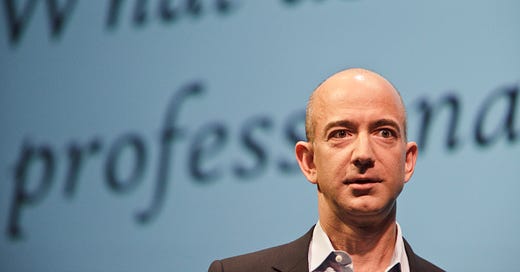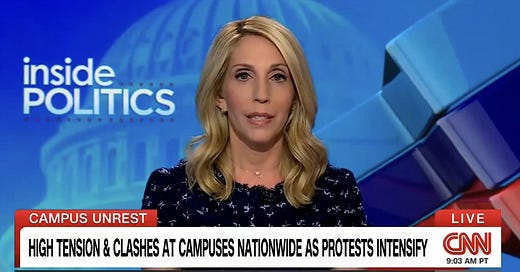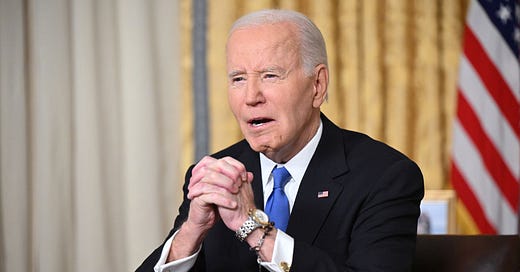
The Washington Post is a very large and very successful newspaper. It is “significant,” even. It is also owned by Jeff Bezos, once the richest man in the history of the human species (before he was demoted to the number three spot behind a beep-boop car man and a fancy clothes guy). The Post regularly cranks out serious and important pieces of investigative journalism and commentary, as well as all of the other dross that a publication needs to exist online (except this one. Our blogs are all killer, no filler). For all of its holier-than-thou posturing and regressive, sexist internal drama, the Post is, on the whole, a worthwhile institution.
Unfortunately, it appears to be in deep financial trouble with morons at the wheel.
According to the similarly holier-than-thou New York Times, the powers that be at the Post are reportedly panicking over what they’ve deemed anemic subscription numbers that have yet to rise above the high water mark set by the paper in 2020. Per the Times:
The organization is on track to lose money in 2022, after years of profitability, according to two people with knowledge of the company’s finances. The Post now has fewer than the three million paying digital subscribers that it had hailed internally near the end of 2020, according to several people at the organization. Digital ad revenue generated by The Post fell to roughly $70 million during the first half of the year, about 15 percent lower than in the first half of 2021, according to a recent internal financial document reviewed by The New York Times.
In fact, things are evidently so dire that CEO and publisher Fred Ryan is floating the idea of cutting a devastating 100 positions from the Post’s newsroom, which inflated drastically following the 2020 successes.
Now, farbeit for me to downplay the financial woes of another media outlet (like and subscribe to discourse blog dot com) but…c’mon. When you’re owned by the third richest dude on the planet, this should simply not be an issue. Rupert Murdoch, who is a whole lot less rich than Jeff Bezos, operates multiple media outlets at a loss, only to make up the difference from his more profitable ventures, and no one bats an eye. After years of being in the black, a 15% drop in digital ad revenue isn’t good, but is it really the crisis the Post seems to think it is? I’m not convinced.
In its defense, the Post responded to the Tuesday’s report by claiming that actually the documents reviewed by the Times were incomplete and, in fact, “the organization was not reducing head count, and instead would be adding steadily to the newsroom.” Okay. Sure.
But things are even dumber than the questionably lackluster financial picture seems to show. Per the Times, the real issue here is that CEO and Publisher Fred Ryan is incensed that his staff isn’t wasting their time in an orderly, quantifiable way. (emphasis mine)
The discussions about budget reductions come as Mr. Ryan has expressed annoyance with senior newsroom leaders at what he sees as a lack of productivity by some journalists at the paper. Last fall, he asked for the company’s chief information officer to pull records on which days employees held videoconference meetings, as a way to judge production levels, and found that fewer meetings occurred on Fridays, according to two people with knowledge of the matter.
He has also grown increasingly frustrated that some Post staff members are still not in the office at least three days a week, the company’s policy.
Because as we all know the pathway to increased productivity runs through Friday zoom meetings and commutes into the office — especially in a field like journalism, where it’s what really matters is spending time talking with your colleagues in your hermetically sealed bubble, instead of getting out into the world and chatting with the people you’re actually writing about.
Oh, but don’t you worry. The Post has plans to right their only-barely tilting ship: buy some expensive shit!
The Post’s executives have had extensive internal talks about whether to buy other major news organizations, according to five people familiar with the matter. The outlets discussed have included The Associated Press, The Economist and The Guardian, some of the people said.
Ah yes, who among us hasn’t looked at a slightly smaller revenue stream and thought “you know what, let’s just gobble up the fucking AP!” If only there were somewhere else the sort of money needed to purchase one of the largest wire services on Earth could be spent…?
Taking a step back from the excessively dumb, comedically slapstick situation the Post now apparently finds itself in, this whole scenario exists because of a fundamental misunderstanding about what capital-J Journalism is — or rather, what it is not: a money-making institution. At least, not at its core. To the extent that genuine journalistic endeavors (I’m not talking about your Fox News or Daily Callers here) work to stay in the black, it’s in service to a tautological necessity that keeps the outlet functioning. The goal of journalism isn’t profit, it’s journalism itself.
When Bezos purchased the Post nearly a decade ago, the hope (perhaps naïve) was that his billions upon billions of dollars in personal wealth could help insulate the paper from the sort of profit-oriented corporate wheeling and dealing that Fred Ryan seems obsessed with. The Post, for a time, was a place that was theoretically unbothered by the industry-wide volatility which has already tossed thousands of talented, dedicated journalists by the wayside in the name of corporate greed. And yet, here we are — with executives at the paper doing what executives do, and the final call likely rests on the whims of the Post’s sole benefactor. There are many other inherent flaws in the single-source philanthropy model of journalism, but the one thing it was supposed to prevent was the imminent threat of mass layoffs at the slightest hiccup in profit margins.
I don’t know what’s going to happen next at the Post. I hope people don’t lose their job, and they don’t close the door on hiring dozens of new staffers. Lord knows more journalists working is better than fewer. For now I suppose we’ll just have to wait and see. In the meantime, I’m off to schedule some last minute Friday zoom meetings, and look up how much it would cost to buy Le Monde.



















These idiots had to know their numbers were going to crater once trump left right? It’s the same as the big cable networks who‘re apparently now considering just pulling the plug on every piece of programming past like 10? They had to know the back to brunch crowd would desert them as soon as the bad orange man was gone? Or am I giving these hacks way too much benefit of the doubt?